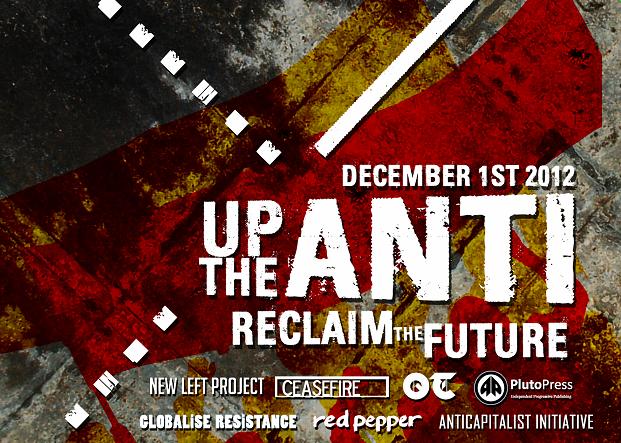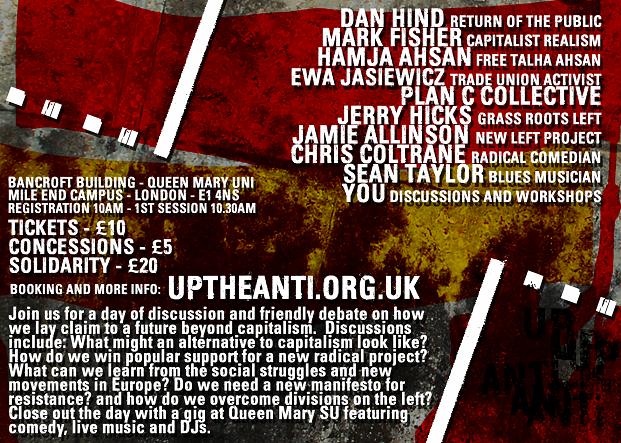Up the Anti: How can we reclaim the future? Event
New in Ceasefire, Politics - Posted on Wednesday, October 31, 2012 0:00 - 1 Comment
By Simon Hardy
In London on 1 December a coalition of left wing publications, websites and networks, including New Left Project, Ceasefire, Occupied Times, Anticapitalist Initiative, Red Pepper and Globalise Resistance, will be holding a conference, “Up The Anti”, the aim of which is to create some space for debates around strategy and ideas for future campaigning. Whilst there are often conferences (unfortunately mostly in London) held by various groups, this is something different. With so many different groups involved we hope that the conference will bring many different perspectives and ideas into an open and democratic conference.
Many of us involved in the Anticapitalist Initiative – which I am a supporter of – see an urgent need to increase the collaboration on the left and fight for a change in culture amongst progressive forces to overcome dogmatism and division which infect both the socialist and anarchist left. In quiet times these problems are merely inconvenient, but at crucial stages in the class war they become a fetter on breaking out of the usual far left isolation and reaching beyond our normal comfort zones.
And the British left has certainly not risen to the challenge of the past few years. As an aggressive attack by sections of the most privileged parts of the capitalist class seeks to reverse everything that we fought for and won after the second world war, the left acknowledges the scale of the problem yet stubbornly refuses to raise its game, to make any kind of radical leap into new and more powerful forms of organisation and resistance.
And the problems run deep. The socialist left still builds its front campaigns, sells its newspapers and stares daggers at each other across the demonstrations. Every sizeable demo is hailed as another decisive blow against the coalition (which, we are constantly reminded, is “weak”), yet the cuts still go through, yet the strikes still fail to materialise or are sold out with little or no repercussions for the bureaucrats who control the union movement.
The libertarian or anarchist left has more success with spectacular stunts and innovative ideas which can really help galvanise new radical forms of thinking, but remains quite mired in sectarian and dogmatic fetishes about organisation and ‘procedure’ which end up repelling more people than they attract. The modern day Bolsheviks praise democratic centralism just as loudly as the libertarians praise completely horizontal forms of spontaneous decision making.
The left fiddles whilst Rome burns.
This is not to say that everything is a failure, but it is clear to anyone that the levels of resistance are not commensurate with the task at hand. The working class and popular radical movements have mobilised to carry out some important struggles (Occupy, the pensions strikes, etc) but the strategic goal seems far away. Some new thinking, and new ways of working will be required.
The conference has two names – the first, “Up the Anti”, refers to the need to deepen and extend the resistance against the government, we need to increase the fight back from the anti-austerity movement, the anti-racist movement, to strengthen the anticapitalist forces.
The second name, “Reclaim the Future”, refers to an important strategic goal that the left must deal with. Since the collapse of the Soviet Union, the international revolutionary left is on the back foot, we lost perhaps our most important political strength, that the progressive left was associated with what was to come, in contrast to the present capitalist system and all its barbarity. After 1991 we lost that position, now we must discuss how and ion what way we can reclaim the future.
The conference on 1 December will not be the final word in this discussion, but we hope to at least take a step down that necessary road.
We have workshops on a range of issues from the struggle against extradition to a debate on Syria, from a discussion on the recently published “What are we fighting for” (Pluto Press) to hearing from housing campaigners fighting rent rises, homelessness and the attacks on squatting.
What is the future of Up the Anti? Will it be a one shot thing which we never hear from again? Everything depends on how the day itself goes, but if it is a success and people want to continue the debates then there is certainly scope for coming back together next year for an even more ambitious event.
At the very least I hope that we can provide a forum for the constituent parts to explore their goals of their projects in closer collaboration. We want a space which is not dominated by any one group with their own agenda, convinced that they have all the answers.
We are ambitious for what we want to achieve, we want new thinking and some new energy to take us forward. In 2013 we need to up the anti, then we need to start to reclaim the future.
For info, updates and tickets, visit the Up The Anti website.
1 Comment
happysmiles




Looks like another networking event clothed as something radical…. Like last year’s Rebellious Media Conference event I suspect to be talked at for most of the event – as opposed to people actually listening to each other.
Another university held event to make the middle classes feel like they are relevant.